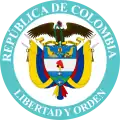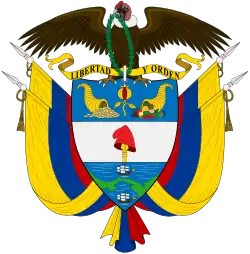Vice President of Colombia
The Vice President of Colombia (Spanish: Vicepresidente de Colombia), officially known as the Vice President of the Republic of Colombia (Spanish: Vicepresidente de la Republica de Colombia) or Vice President of the Nation (Spanish: Vicepresidente de la Nacíon) is the first in the presidential line of succession, becoming the new President of Colombia upon leave of absence or death, resignation, or removal of the president, as designated by the Colombian Constitution of 1991 which also reinstated the vice president figure after almost a century of being abolished during the presidency of Rafael Núñez. The vice president cannot assume presidential functions on temporary absences of the president such as official trips abroad or vacations. In these cases, the president delegates functions to a cabinet member, usually the Minister of the Interior.
| Vice President of the Republic of Colombia | |
|---|---|
| Vicepresidente de la Republica de Colombia | |
 | |
 | |
| Executive branch of Colombia Administrative Departament of the Nation | |
| Style | Madam Vice President (informal) The Honorable (formal) Madam Vice President of the Nation (within the Senate) Her Excellency (diplomatic) |
| Status | Second highest executive branch officer President of the Senate |
| Abbreviation | Vice President of the Nation |
| Member of | Cabinet National Government Council of Ministers of Colombia National Congress |
| Residence | Private Residence |
| Seat | Bogotá, D.C. |
| Appointer | Popular Vote, or, if vacant, President via Constitutional |
| Term length | Four years, no renewable |
| Constituting instrument | Constitution of Colombia |
| Formation | 17 December 1819 |
| First holder | Francisco Antonio Zea |
| Succession | First |
| Salary | $235,100 annually |
| Website | Vicepresidencia de la República |
The current vice president of the Republic of Colombia is Marta Lucía Ramírez, who took office on 7 August 2018.
Functions
The vice president has the same period of functions that the President of Colombia and will replace him in case of temporary or complete absences. The vice president can also be authorized by the president special missions (like to represent him on international diplomatic visits) or designate him in any position of the Colombian Executive branch of Power.
Every president has defined the vice president's functions within their government.
Constitutional mandate
According to the Decree 2719 of 17 December 2000 in the Colombian Constitution of 1991 which modified the structure of the Administrative Department of the Presidency of the Republic, the functions of the vice president are:
- To execute special missions set by the President of Colombia and in accordance with the Colombian Constitution.
- Advise the president on the execution of policies and politics regarding Human Rights and Corruption.
- Collaborate with the Colombian government's management of international and national activities regarding Human Rights and corruption.
- Plan mechanisms to harmonize agreements between the different levels of the executive government in Colombia on issues regarding Human Rights and corruption.
- Represent Colombia internationally as ordered by the president.
- By determination of the president, the vice president will support and advise the president on other issues.
- Other functions will be addressed according to the needs of the president.
Eligibility
The vice president must be a natural-born citizen of Colombia, at least 30 years of age. The Colombian Constitution of 1991 requires the vice president to meet the same eligibility requirements as the president that can be re-elected. He or she is also eligible for an unlimited number of terms as vice president.[1]
Line of succession
Minister of interior
The Minister of intarior of Colombia is the second in the presidential line of succession, becoming the new president of Colombia and completing the remaining term upon leaves of absence or death, resignation, or removal of the vice president, even if such a vacancy should occur before the minister of the interior assumes office, as designated by Article 203 of the Constitution of 1991.
Further succesion
In absence of both the president and the vice president, Article 203 of the Constitution of 1991 establishes that the presidential office will be assumed by a minister in the order of precedence established by law. The assuming minister has to be a member of the same party or movement the original president belonged to, and will exercise the presidency until the Congress, within the 30 days following the presidential vacancy, elects a new vice president who will assume the presidency.
Current order
 |
|---|
|
|
See also
References
- "Requisitos para ser candidato presidencial". pdba.georgetown.edu. Retrieved 14 March 2017.
- "Diego Andrés Molano Aponte – Ministro de Defensa Nacional". mindefensa.gov.co. Retrieved 16 May 2021.
{{cite web}}: CS1 maint: url-status (link) - "Quién es Diego Molano, el nuevo ministro de Defensa de Colombia". AS Colombia (in Spanish). 2 February 2021. Retrieved 16 May 2021.
_(cropped).jpg.webp)